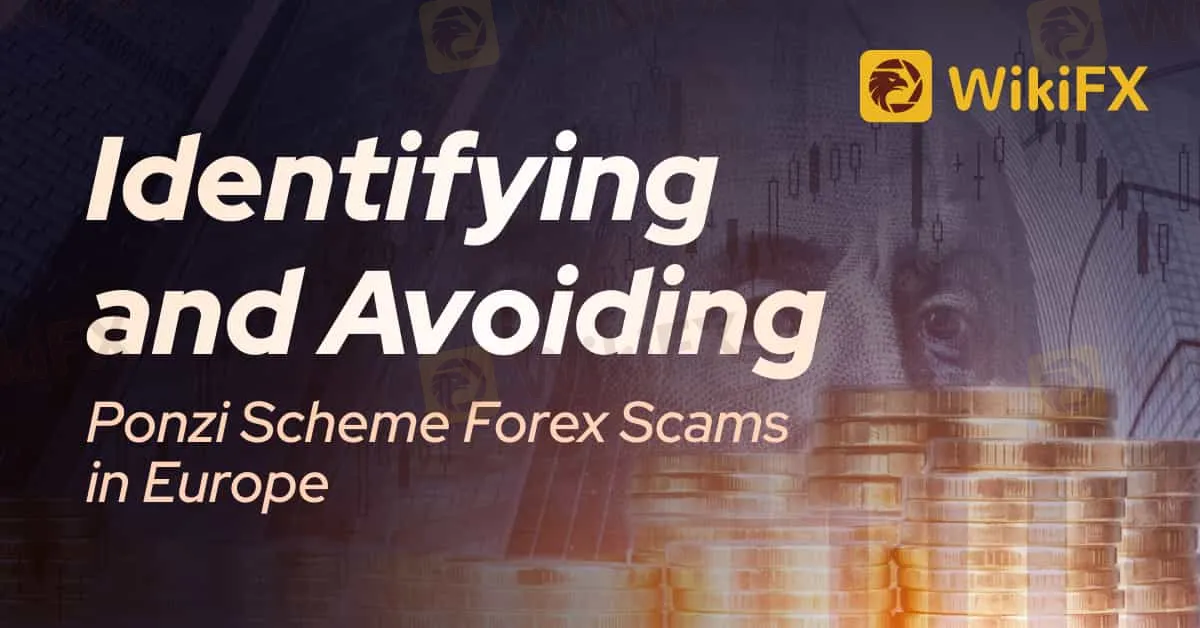简体中文
繁體中文
English
Pусский
日本語
ภาษาไทย
Tiếng Việt
Bahasa Indonesia
Español
हिन्दी
Filippiiniläinen
Français
Deutsch
Português
Türkçe
한국어
العربية
Identifying and Avoiding Ponzi Scheme Forex Scams in Europe
Abstract:Ponzi schemes have been a persistent problem in the financial industry, and forex markets are not exempt from their reach. These scams promise unrealistically high returns, often through forex trading, but instead rely on new investors' funds to pay off older investors. In this article, we will discuss how to identify and avoid Ponzi scheme forex scams in Europe.

Ponzi schemes have been a persistent problem in the financial industry, and forex markets are not exempt from their reach. These scams promise unrealistically high returns, often through forex trading, but instead rely on new investors' funds to pay off older investors. In this article, we will discuss how to identify and avoid Ponzi scheme forex scams in Europe.
Unrealistic Promises
Ponzi schemes lure victims with promises of extraordinary returns on investments. Be cautious of any scheme that guarantees high, consistent profits with little to no risk. Remember, if it sounds too good to be true, it probably is.
Lack of Transparency
Ponzi schemes often lack transparency when it comes to sharing information about their trading strategies or the specifics of their investments. Legitimate forex trading firms provide transparent information about their strategies and investments, while Ponzi schemes rely on secrecy and vague explanations.
Pressure to Recruit
Ponzi schemes typically encourage participants to recruit others to join the scheme. This is done to sustain the flow of new investments, as the funds from new recruits are used to pay off older investors. If a scheme emphasizes recruitment over actual trading, it's likely a Ponzi scheme.
Verified Track Record
Legitimate forex firms can provide verifiable records of their trading history, demonstrating consistent returns over time. In contrast, Ponzi schemes often fail to provide audited records or any evidence of their trading activities. Request proof of trading performance before investing.
Conclusion
Protecting yourself from Ponzi scheme forex scams in Europe requires vigilance and skepticism. Avoid schemes that promise unrealistic returns, lack transparency, or emphasize recruitment over trading. If you suspect a scheme may be a Ponzi scheme, report it to the appropriate authorities immediately. For more information on forex scams and reliable resources, visit WikiFX at www.wikifx.com. They offer valuable insights and tools to help traders make informed decisions and avoid falling victim to fraudulent schemes.

Disclaimer:
The views in this article only represent the author's personal views, and do not constitute investment advice on this platform. This platform does not guarantee the accuracy, completeness and timeliness of the information in the article, and will not be liable for any loss caused by the use of or reliance on the information in the article.
Read more

Female Celebrity Voluntarily Surrenders Over SEC Violation Charges
Rufa Mae Quinto faces 14 counts of SEC violations linked to Dermacare's investment scheme. She denies fraud allegations and posts P1.7M bail.

RM5.9M Lost to "Davidson Kempner Capital Management" Facebook Scam
A private contractor in Malaysia faced a devastating loss of over RM5.9 million after falling victim to a fraudulent investment scheme promoted on Facebook. Tempted by the scheme’s impressive claims and credentials, the victim began investing in September 2024. The investment process required him to download an application called A-Trade, which was readily available on the Apple Store.

BI Apprehends Japanese Scam Leader in Manila
The Bureau of Immigration apprehended a Japanese scam leader in Manila for targeting elderly victims in Japan, with plans to investigate possible local operations.

Dutch Law Student Arrested for €4.5 Million Crypto Scam
Dutch police arrest a law student for a €4.5M crypto scam, exposing pyramid schemes and investor losses.
WikiFX Broker
Latest News
BI Apprehends Japanese Scam Leader in Manila
Bitcoin in 2025: The Opportunities and Challenges Ahead
Join the Event & Level Up Your Forex Journey
Is There Still Opportunity as Gold Reaches 4-Week High?
Bitcoin miner\s claim to recover £600m in Newport tip thrown out
Good News Malaysia: Ready for 5% GDP Growth in 2025!
How to Automate Forex and Crypto Trading for Better Profits
Breaking News! Federal Reserve Slows Down Interest Rate Cuts
Beware: Pig Butchering Scam Targeting Vulnerable Individuals
This Economic Indicator Sparks Speculation of a Japan Rate Hike!
Currency Calculator






